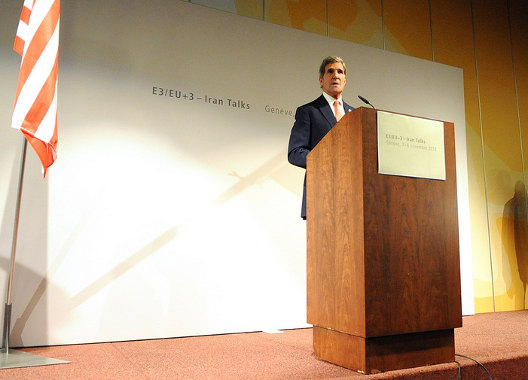 The latest P5+1 talks with Iran in Geneva have resulted in little tangible progress, but experts are optimistic about the potential for a deal when talks resume later this month.
The latest P5+1 talks with Iran in Geneva have resulted in little tangible progress, but experts are optimistic about the potential for a deal when talks resume later this month.
Related ContentRead, listen to, and watch Barbara Slavin‘s interviews with CFR, PRI, and RT. |
Barbara Slavin, a senior fellow in the Atlantic Council’s South Asia Center, outlined why there were reasons to be upbeat about the potential of reaching a deal on freezing Iran’s nuclear program in an interview with the Council on Foreign Relations.
“My impression is that we are close…that we’re not far from an agreement, that there are still a couple of important questions that need to be settled, but that they’re still expecting, as Secretary of State John Kerry has said, that this is a ‘doable deal’ when talks resume November 20.”
The weekend talks in Geneva stretched into an unscheduled third day Saturday. The importance of the talks was highlighted by the fact that five of the six P5+1 countries—the United States, the United Kingdom, Russia, France, and Germany—sent their top foreign ministers. Only China opted to send a deputy. Kerry spent five hours with Iranian Foreign Minister Javad Zarik, an unimaginable occurrence a year ago. As Kerry told the BBC, the United States and Iran “haven’t been speaking for thirty-five years. We just talked more in thirty hours than we have in those prior thirty years.”
Slavin, like Kerry, sees the reopening of the diplomatic dialogue as highly significant.
“The good news is that the United States and Iran are talking together routinely, and surely they have reached some understandings. The question is: can they put it into language that everybody can accept?”
And therein lies the difficulty. “The failure to reach agreement over the weekend in Geneva was really about the fact that there were just too many political sensitivities at stake for the quick resolution of a ten-year-old conflict,” Michael Hirsh pointed out in a recent article.
Although the negotiations are tightly focused on Iran’s nuclear program, a whole host of issues threaten to jeopardize the talks. One is Iran’s continued backing of Syrian President Bashar al-Assad. Another is Israel, which plans on using the ten-day window before negotiations start again to inform senior members of Congress of the country’s opposition to the possible nuclear deal.
“(The proposed deal) runs the danger of legitimizing Iran as a nuclear threshold nation. That is clearly against the interests of the international community,” Israeli Prime Minister Benjamin Netanyahu said Tuesday.
Still, the weekend was not a total stalemate. While the press reports coming out of Geneva are filled with finger-pointing as to who is to blame for the lack of a deal—with the French and the Iranians garnering the most nominations in that category so far—the International Atomic Energy Agency (IAEA) did manage to nail down a joint statement on a framework for cooperation.
“It’s the first such agreement in six years. It’s quite detailed and says that the Iranians will give the IAEA early notification of any new nuclear facilities it is going to undertake. This is something that Iran is not obliged to do under the Nuclear Nonproliferation Treaty, but it is something that has been eagerly sought by the IAEA for some time—so it’s a very important step,” Slavin said.
When talks resume on November 20, the hopes of many will be understandably high. All parties involved seem deeply invested in capitalizing on the diplomatic opening created by the June election of moderate Iranian President Hassan Rouhani. The chance for incremental progress is very real, as is the opportunity to lay down the groundwork for longer-term agreement.
Catherine Putz is a digital communications assistant at the Atlantic Council.
Image: US Secretary of State John Kerry addresses an international press corps after he and fellow representatives of the P5+1 concluded talks in Geneva, Switzerland, on November 10, 2013, that focused on Iran's nuclear capabilities. (Photo:State Department/ Public Domain)
